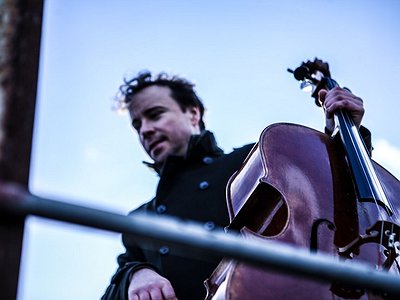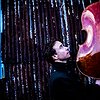Part 2
With more and more musicians performing and recording than ever, what does this mean for you as an artist in terms of originality, especially when it comes to questions of style and interpretation? What are some of the approaches and artists that you personally find inspiring in this regard?
Generally speaking, I think 'style' is a red-herring. The style will emerge if you pay attention to meaning and expression. If you spray-paint a received notion of style onto something, it tends to conceal rather than reveal it. 'Interpretation' on the other hand - yes please. If only the classical world and its training would dig deeper and take more risks in this regard. 'Originality' and 'classical music interpretation' - again, in general terms, as concepts, pretty estranged bedfellows these days.
So, Il Giardino Armonico - fabulous and carefree. When I first heard their Four Seasons, I thought - artists, adventurers, communicators. Some of the younger generation of re-inventors and artists - Brooklyn Rider, ZRI, A Far Cry, David Gordon, David Le Page - musicians with the chops and the imaginations to move beyond the notes.
I'm about to record some 'core' repertoire - Schumann, Brahms, Elgar - and beyond interpretation, I'm also looking at a sonic and human context for these canonical works to live and breath within.
What are some of the quality criteria for a good recording from your perspective, what role can technology play and in which way will a recording even allow you to approach a piece from an entirely different perspective?
The microphone allows you to get up close and personal. Marvin Gaye, at the end of his career, talked about finding the truth in the song and the singing of it by singing quietly, intimately. Recording can give you restricted access to that private space.
I enjoy working with the technology to graft a way to that intimate, honest place - there isn't always the luxury of time and money to do that, especially if you're recording with large forces - but then I look to put that particular kind of graft into my preparation.
Of course, 'recording' is a misnomer - given that music is much more than purely sonic, most records fall way short of actually recording what the music really is. And I guess working within those more limited parameters is part of the challenge - how do you convey the heart-pounding, hair-raising, breath-taking?
And for me, those are some of the quality criteria - does the recording convey those visceral qualities?
Do you feel it important that an audience is able to deduct the processes and ideas behind a work purely on the basis of the music? If so, how do you make them transparent? Do you, in general, feel that, as part of your work, music needs to be explained or should it retain its “inexplicable nature”?
Oooff! Personally, I try to reveal rather than explain. Like Peter Brook, I also think that, if left to speak for themselves, not all works of performance art - theatre and music - will actually sound.
I was at a film premiere once where Tom Wilkinson was asked by a critic about his character's views on war. Mr Wilkinson gave what I thought was a great answer, 'I'm busy dodging bullets.' So, processes and ideas are interesting but in the moment of performance - for both performer and audience - I think there are much more important things to attend to.
Making an interpretation of any kind means paying attention to form and content along the way and if that has taken place then transparency will be in the room.
What constitutes a good live performance in your opinion? What’s your approach to performing on stage?
Carefree, laying it on the line, performing like there's no tomorrow.
Knowing that this is for one night only.
As Charles Rosen put, “the death of classical music is perhaps its oldest continuing tradition”. From your perspective, what are some of the root issues for what is generally referred to as the “crisis of classical music”, which also includes the scene for contemporary composition, and what, to you, are sensible ideas for improving it?
1) Recording - in relation to the canon, it tends to breed the 'generic' and the 'definitive', which are irrelevant concepts in relation to music.
2) In England, an appropriation of the art by a kind of feudality - of course, the art itself has very little to do with a class structure. Beethoven wanted to change the world with his music - he and many other composers wrote music for the world and for people. Let 'classical' music be performed in places and with those attitudes that means it can be in the world and for people. Baz Luhrman, Northern Broadsides, Kurosawa, South Sudan Theatre Company - and countless other global phenomena - do the same for Shakespeare, for instance.
3) Education - buying and learning an instrument is expensive. Music and musical resources at the centre of an educational framework is a no-brainer - as all of the excellent research of the last 25 years proves beyond a doubt. (Not reiterating this research to a succession of selectively-hearing government administrations would also improve matters, allowing a legacy to be built on solid research. Look at Finland, for instance).
4) Music training - specialist music training geared to the 21st not 19th century. Training that explores 'classical' music as part of the wider world, - socially, economically, politically - not solely as a vacuum-packed, inward-looking phenomenon.
5) Hands-on time in theatres with dramaturgs for would-be opera composers.
6) An encouragement in their training for 'performers' to 'compose/create' - less abdication of creative responsibility to producers, conductors, directors, administrators etc.
How's that, for starters?
What's your view on the role and function of music as well as the (e.g. political/social/creative) tasks of artists today - and how do you try to meet these goals in your work?
These are great questions! People lead busy, tiring lives. Mainly, I want to uplift those lives - create a domain for people to have a fabulous time with amazing music. Laughing and crying are my barometers.
I also know music can save, rescue, transform lives - it did that for me. So, I like to go to the hard-to-reach place with music and theatre - get in a room and work with people, get back to first principles and find that - at ground zero - music and theatre are alive and kicking.
Reaching audiences usually involves reaching out to the press and possibly working with a PR company. What's your perspective on the promo system? In which way do music journalism and PR companies change the way music is perceived by the public?
I've had a great time working with WildKat - they can access and engage the promo system effectively and efficiently, so I'm not wasting time and energy and can get on with what I do. In general, mainstream terms, I find the printed and broadcast voice for classical music tending towards the reactionary or the ranty. If someone like David Sexton fancied a classical music spell, I think that would be fantastic and refreshing!
Visit Matthew's website at www.matthewsharp.net






